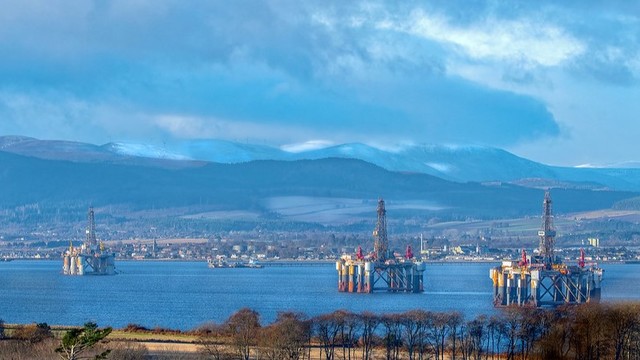A year ago today, the oil industry was shaken by a blowout on the Deepwater Horizon rig, 1500 metres deep in the Gulf of Mexico. The explosion killed 11 people and spilled 200 million gallons of oil. BP’s bill – over US$8 billion to date – is expected to reach US$32 billion after all damage claims have been made.
BP wasn’t solely responsible for the spill. BP’s contractors were also held to task, including Transocean, the rig owner; Halliburton, who did the cement job; and Cameron International, who built the blowout preventer. The incident highlighted the complexity – and vulnerability – of today’s oil and gas contracting arrangements.
IIED’s new report Shared value, shared responsibility: a new approach to managing oil and gas contracting chains argues that a shift in industry culture is required to manage the challenges posed by complex chains of oil and gas contractors in increasingly risk-laden environments.
A high-risk industry in an age of complexity
Major oil and gas companies contract out on average 75% of activities to specialised service providers as a way to increase efficiency and outsource risk. Contractors also subcontract out many tasks. This means the management of environmental and social risks is a complicated business.
Risks are increasing … High oil prices and energy security concerns are driving the industry into deeper waters, the Arctic, tar sands and conflict zones. Risks multiply in less developed countries where corruption may be endemic and governance weak. Governments may also require projects to use local companies that are less familiar with international standards and practices.
Aftermath of disaster – sharpening up standards
Following from the Gulf of Mexico spill, the US government restructured the regulating body, the Minerals Management Service (MMS), which had been criticized for inadequate oversight (and a history of corrupt practices). The new, robustly named Bureau of Ocean Energy Management, Regulation and Enforcement introduced ‘aggressive and comprehensive’ new regulations.
BP’s own Accident Investigation Report made 25 recommendations to avoid such a disaster happening again, with an emphasis on sharpening up their standards and increasing oversight and assurance.
But what has really changed in the industry as a whole? Transocean, the world’s largest offshore rig company, lost nine employees in the explosion but still awarded its executives bonuses for 2010, calling it ‘the best year in safety performance in our company’s history’.
It’s all about incentives
The new US regulations stipulate that an operating company CEO must certify that a well has complied with all regulations. But can a CEO’s signature guarantee that standards are upheld by everyone involved in the oil operation? Issues arise when top-down enforcement of standards rubs up against a contracting, reporting and bonus-giving culture that incentivizes a different kind of behaviour.
- Incentives and penalties in contracts between operating companies and contractors tend to prioritise speed and cost of project delivery over responsible practice. This provides a disincentive to individuals to ‘blow the whistle’ – and cause delays – if minor incidents happen.
- In fixed-sum contracts, environmental budget lines are rarely ring-fenced, so could be used to cover other (non-environmental) costs of project delivery.
- A company Code of Conduct or a 10,000-page environmental impact assessment might be appended to contracts at the last minute, leaving contractors to constantly play catch-up.
- Reporting that consists of ticking boxes in multiple spreadsheets may or may not capture the reality of what is happening on the ground.
As a result, corners may be cut when it comes to environmental and social protection.
A culture of complacency?
William Reilly, the co-chairman of the US National Commission investigating the spill, blamed a ‘culture of complacency’ within BP, Halliburton and Transocean. Reilly referred to poor decision-making, badly run tests, warning signs being ignored, and the failure of all, including senior executives, to take risks seriously. ‘Financial pressures and time limits’, he argued, had a major impact on individuals’ responses.
The false reassurance or sheer bafflement caused by complex procedures and technology can undermine individuals' preparedness for a catastrophic event, especially if a risk assessment judges it to be ‘highly unlikely’ or if a state-of-the-art blowout preventer is in place.
Corporate social responsibility indices, rankings and awards also tend to rely too much on company commitments and reporting in public documents and not enough on independent evaluation of actual practice. In September 2010, FTSE4Good finally removed BP from its ethical list, but previously BP had consistently been at the top of various rankings, despite a history of safety breaches.
Taking action
We need to move away from our reliance on standards and commitments on paper to judge corporate performance and guide ethical investment. The industry needs to put the right incentives in place to foster a genuine culture of risk-preparedness, openness and collaboration throughout oil and gas operations.
Shared value, shared responsibility proposes a range of actions, including balancing incentives in contracts for cost, schedule, and responsible practice; ring-fencing budget lines for environmental and social protection; allowing time for companies and contractors to align risk mitigation approaches; supporting and training; ensuring excellent communication and oversight; and learning from the good practice that does exist!
For more information contact co-authors Emma Wilson (emma.wilson@iied.org) and Judy Kuszewski (judy@kuszewski.net). See the 8-page briefing and take a look at Judy’s blog, too.




